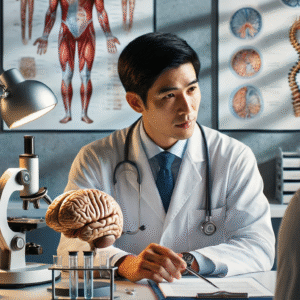Overview:
General Practitioner GPT: Enhanced Healthcare Assistant for Primary Care
The General Practitioner GPT is a cutting-edge AI model designed specifically to meet the needs of healthcare professionals in primary care settings. Built on the latest advancements in AI technology, this model provides a comprehensive suite of tools to assist general practitioners (GPs) in diagnosing, managing, and treating a wide array of medical conditions. Leveraging deep medical knowledge and advanced natural language processing, the General Practitioner GPT delivers precise, evidence-based information quickly and efficiently, empowering GPs to enhance patient outcomes and streamline their practice management.
Key Features and Capabilities:
- Advanced Diagnostic Support:
- Provides differential diagnosis suggestions based on a comprehensive analysis of patient symptoms and medical history.
- Integrates with electronic health records (EHRs) to offer context-aware diagnostic recommendations.
- Utilizes pattern recognition algorithms to detect rare or complex conditions, enhancing early diagnosis capabilities.
- Evidence-Based Treatment Recommendations:
- Offers up-to-date, guideline-based treatment protocols for a wide range of conditions, including chronic diseases, acute infections, and mental health issues.
- Suggests tailored medication options with detailed information on dosages, side effects, contraindications, and drug interactions.
- Supports personalized treatment plans by factoring in patient-specific data such as age, comorbidities, and allergies.
- Comprehensive Patient Education Resources:
- Generates easy-to-understand educational materials for patients, covering disease management, lifestyle modifications, and preventive care.
- Provides customizable handouts and digital content to enhance patient engagement and adherence to treatment plans.
- Includes multilingual support, ensuring accessibility for diverse patient populations.
- Clinical Decision-Making Tools:
- Integrates clinical decision support systems (CDSS) to assist with risk stratification, triage, and referral management.
- Offers real-time alerts for potential drug interactions, allergies, and contraindications.
- Facilitates shared decision-making by presenting pros and cons of different treatment options.
- Continuous Learning and Professional Development:
- Provides access to the latest research, clinical guidelines, and medical advancements, enabling GPs to stay current with emerging trends.
- Includes a built-in CME (Continuing Medical Education) tracker to help practitioners meet licensing requirements.
- Encourages evidence-based practice by linking to peer-reviewed studies and medical journals.
- Secure and Compliant Infrastructure:
- Ensures compliance with HIPAA, GDPR, and other relevant data privacy regulations, safeguarding patient information.
- Utilizes advanced encryption and secure cloud storage to protect sensitive data and maintain confidentiality.
- Offers audit trails and access logs to enhance accountability and transparency.
- Customizable Workflow Integration:
- Seamlessly integrates with practice management software, EHR systems, and telemedicine platforms.
- Supports automation of routine administrative tasks such as appointment scheduling, prescription refills, and billing.
- Allows for custom protocol development and practice-specific guideline adjustments to fit individual practitioner needs.
Conclusion:
The General Practitioner GPT is an essential tool for healthcare professionals looking to enhance their clinical practice with the power of AI. Its advanced features provide robust support for diagnosis, treatment, patient education, and practice management, all while maintaining strict compliance with privacy and regulatory standards. With its ability to integrate seamlessly into existing workflows and support continuous professional development, the General Practitioner GPT empowers GPs to deliver high-quality, patient-centered care efficiently and effectively.
Frequently Asked Questions (FAQs):
Q1. What differentiates General Practitioner GPT from other medical AI tools?
Answer: General Practitioner GPT is specifically tailored for primary care settings, focusing on providing comprehensive diagnostic support, evidence-based treatment recommendations, and patient education resources. Unlike generic AI tools, it integrates directly with EHR systems and offers personalized insights based on individual patient data.
Q2. How does General Practitioner GPT ensure patient data privacy and security?
Answer: General Practitioner GPT adheres to HIPAA, GDPR, and other relevant data privacy regulations. It employs advanced encryption, secure cloud storage, and robust access controls to safeguard patient information, ensuring confidentiality and data integrity at all times.
Q3. Can General Practitioner GPT be customized to fit the specific needs of my practice?
Answer: Yes, General Practitioner GPT is highly customizable. It allows practitioners to integrate their own protocols, modify existing guidelines, and tailor its features to fit the unique requirements of their practice, ensuring a seamless integration with their workflow.
Q4. Does General Practitioner GPT support integration with other healthcare software?
Answer: Absolutely. General Practitioner GPT is designed to integrate smoothly with various healthcare software, including electronic health records (EHRs), practice management systems, and telemedicine platforms, enhancing overall practice efficiency and patient care coordination.
Q5. How does General Practitioner GPT stay updated with the latest medical research and guidelines?
Answer: The model continuously accesses and integrates information from trusted medical databases, peer-reviewed journals, and clinical guidelines. This ensures that all recommendations and information provided are based on the most current and relevant medical evidence available.















